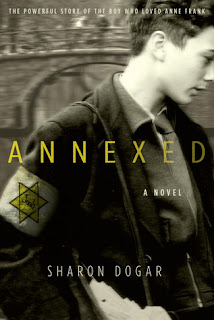
Reading & Writing
I read. A lot. And now I write about it.
Friday, June 17, 2011
Annexed by Sharon Dogar

Wednesday, June 1, 2011
If Darwin Prayed

Our faith was never meant to stand still. We were meant, from the beginning, to grow in all things. Just as our understanding of God and what it means to be part of a faith community--and to be human--evolves, so too does our universe live and evolve. It's the stuff of Darwin, and it's the stuff of If Darwin Prayed: Prayers for Evolutionary Mystics by Bruce Sanguin.
If Darwin Prayed is a prayer book that includes prayers for all seasons included in the lectionary as well as a few additional times of year. Prayers for Advent, Christmas, Epiphany, Lent, Palm Sunday and Good Friday, Easter and the Ordinary Season are all included--most with a scripture reference upon which the prayer is based or from which it is derived.
The language is expressive and colorful. It's not everyday that one includes "silencing the political party poopers" in a prayer. It's not every church that can tolerate such things. Other prayers stir in the reader (pray-er) a desire for peace, to right the wrongs of our planet, to care for the Earth, to take one's place in the Earth as members of her community, to express gratitude for...well...all things.
This prayer book reminds us all that our faith should never stay in one place--and neither should the prayers we pray in corporate or personal worship. Although I've not yet read all of them, I have certainly found several that will be incorporated in my personal time of prayer.
My encouragement is that you not allow the mention of Darwin to scare you off. Instead, my hope is that you will be inspired to move beyond where you currently are and use this book as one of many tools to aid that endeavor.
*********************************************************
Thanks to Speak Easy for sending this book for me to review.
Tuesday, May 31, 2011
Fall to Grace

Fall to Grace: A Revolution of God, Self, and Society is author Jay Bakker’s call to re-examine our individual and collective thoughts on grace–what it really is, who really gets it, and what it would look like if we really extended it to everyone.
Jay Bakker is the son of the well-known (infamous?) Jim and Tammy Faye Bakker of 80′s televangelism. Most of us remember how that turned out. Suffice it to say that Jay has a leg to stand on where a conversation around grace is concerned. Indeed, he spends the first couple of chapters describing what it was like for him to be part of that family at the highest and lowest points.
With humorous and earthy tones, Bakker takes us on a journey that explores , in order, who this God is who freely bestows grace, who we are as individuals working (unnecessarily so–it’s grace after all) to receive grace, and what it would look like if we extended grace to the world around us. Indeed, he calls it a revolution.
If we could see God as a loving, doting parent who wants the best for all of God’s children–that we are punished by our “sin” and not for it–and as the parent who welcomes all of your friends over to the house with a stocked pantry and fridge, how would that change the way we view grace?
If we could see ourselves as broken, yes, but still loved by this God of grace, unconditionally and without exception, how would that change the way we receive grace?
If we could look at the society and people around us, with all of their bent and broken ways, with all of their flaws, knowing what we do about God’s grace and having received it as we have, how would that change the way we welcomed others?
These, I think, are the points Bakker tries to make over the course of this book. He provides plenty of scripture–primarily using Galatians as the backdrop. He offers a reasonable base for why so many in the church have botched it. He includes personal accounts from others who have re-discovered grace. And just about the time you’ve considered joining this new revolution (if you’re not already there), he offers up a platform for why the lines we draw in religious organizations around the issue of homosexuality are way off base.
As for this reader, I was with Bakker the whole way. For those who struggle with accepting grace (or bestowing it), this just might be the book for you to really think about who God is, what it means to really and truly receive grace, and how well you include or exclude others from participating in the work of the Kingdom on matters that, in the grand scheme of things, don’t matter at all.
This book was a quick and easy read–and well worth the time.
************************************************************
Thanks to TheOOZE.com for sending me the book and extending grace on a late review over at mwhitehouse.wordpress.com.
Tuesday, January 11, 2011
Memoirs of a Geisha
 Contrary to (probably) popular Western belief, a geisha is an artisan, an entertainer--not a prostitute. Arthur Golden's Memoirs of a Geisha is the story of Sayuri, once known as Chiyo who, along with her sister, were sold as young girls. They were separated once they arrived in Kyoto, and Chiyo went to live and work as a maid in an okiya, with the understanding that she would one day train to become a geisha.
Contrary to (probably) popular Western belief, a geisha is an artisan, an entertainer--not a prostitute. Arthur Golden's Memoirs of a Geisha is the story of Sayuri, once known as Chiyo who, along with her sister, were sold as young girls. They were separated once they arrived in Kyoto, and Chiyo went to live and work as a maid in an okiya, with the understanding that she would one day train to become a geisha.